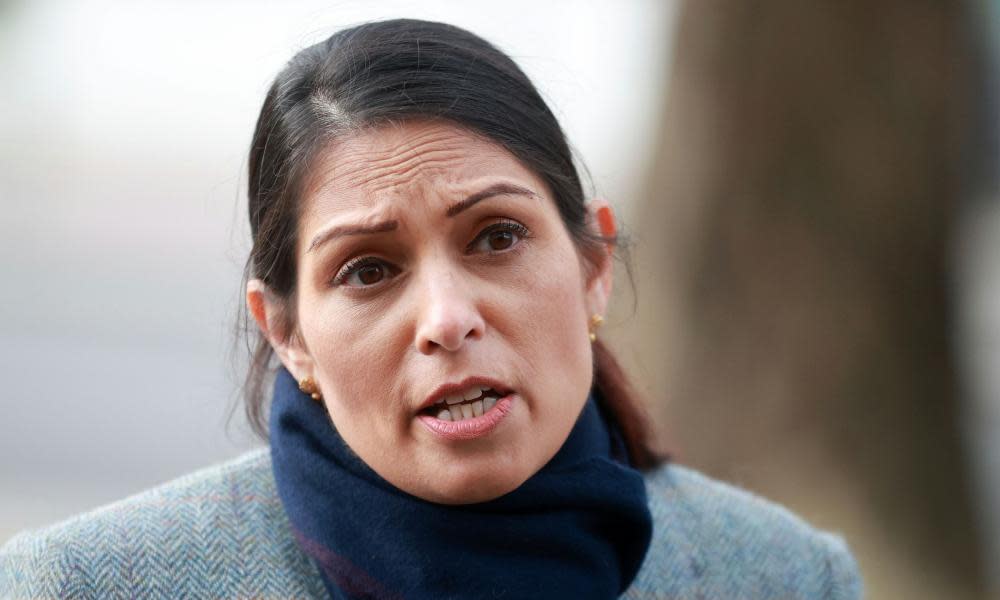Priti Patel says she wanted UK borders shut last March

The home secretary, Priti Patel, is at the centre of a fresh row after saying the UK’s borders should have been closed earlier, claiming she had been an advocate of shutting them at the start of the Covid pandemic last March.
In comments that seemed to put her at odds with Downing Street, which only last week announced a tightening of borders, Patel said she was in favour of clamping down on travel 10 months ago.
The remarks put Boris Johnson under pressure at prime minister’s questions, with Keir Starmer, the Labour leader, asking why he did not take Patel’s advice at the time.
Last week Johnson announced the suspension of travel corridors to “protect against the risk of as yet unidentified new strains”. Anyone flying into the UK is required to show proof of a negative Covid test before setting off. International arrivals have to quarantine for 10 days unless they test negative after five days.
In comments first reported by the Guido Fawkes website and made a day after the new policy came into effect, Patel said she had been an advocate of tightening borders at the start of the pandemic. Patel reportedly told the Conservative Friends of India group during a Zoom call on Tuesday: “On ‘should we have closed our borders earlier?’, the answer is yes, I was an advocate [of] closing them last March.”
Travel corridors allowing arrivals from certain destinations with low rates of Covid-19 to avoid quarantine were introduced in July last year, the month after the government moved to implement quarantine restrictions on international arrivals. There have been frequent changes to the corridors in recent months, with countries dropped from the list as infection rates have fluctuated.
At PMQs, Starmer said the government was not disputing Patel’s version of events, asking: “Why did the prime minister overrule the home secretary?”
Johnson ignored the question, saying only that the UK had “introduced one of the toughest border regimes in the world”. The PM added: “I’m delighted that he now praises the home secretary.”
default
Starmer asked the same question again, which Johnson avoided for a second time.
Last March the Daily Telegraph reported that Patel and Johnson were embroiled in a row over closing borders, with the prime minister said to have refused a plea from the home secretary to halt flights to the UK.
Responding to Patel’s latest comments, the shadow home secretary, Nick Thomas-Symonds, said: “This is a shocking admission from the home secretary about the government’s failure to secure the UK’s borders against Covid.
“Priti Patel’s admission, coupled with the complete lack of strategy for testing of travellers, means that the government has left our doors open to the virus and worrying mutations. Ministers now need to urgently review and overhaul border policy, whilst taking responsibility for the huge damage their incompetence has done to our national safety and security.”
A Home Office spokesperson said: “We have strong measures in place at the border, which are vital as we roll out the vaccine.”
In a damning report last year, MPs concluded that the government’s failure to impose special border measures in the run-up to the first Covid lockdown was “a serious mistake” that significantly increased the pace and scale of the epidemic.
From late January to mid-March 2020, the UK introduced a series of travel measures, including quarantining 273 people mainly from Wuhan, as well as issuing non-mandatory guidance to self-isolate for 14 days to travellers coming from designated high-risk countries. The list of locations, which was incrementally expanded, included China, Iran and Italy by mid-March. But it was withdrawn on 13 March without a reason being given and there were no border measures in place for almost three months until 8 June, according to the report published in August by the Commons’ home affairs committee.
In the 10 days between the withdrawal of guidance and the introduction of lockdown on 23 March, the report stated, evidence suggested that thousands of new infections were brought in from Europe. “It is highly likely that this contributed to the rapid increase in the spread of the virus in mid-March and to the overall scale of the outbreak in the UK,” they concluded.
Responding to Patel’s latest comments, Labour MP Yvette Cooper, chair of the home affairs committee which produced the report, said: “I have been raising the issue of the UK’s weak border measures with the home secretary and the government repeatedly since last March and up until now everyone has defended the decisions made at the start of the pandemic not to have stricter border and quarantine measures in place.”

 Yahoo Movies
Yahoo Movies 
